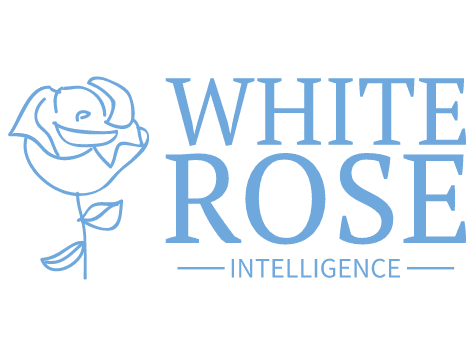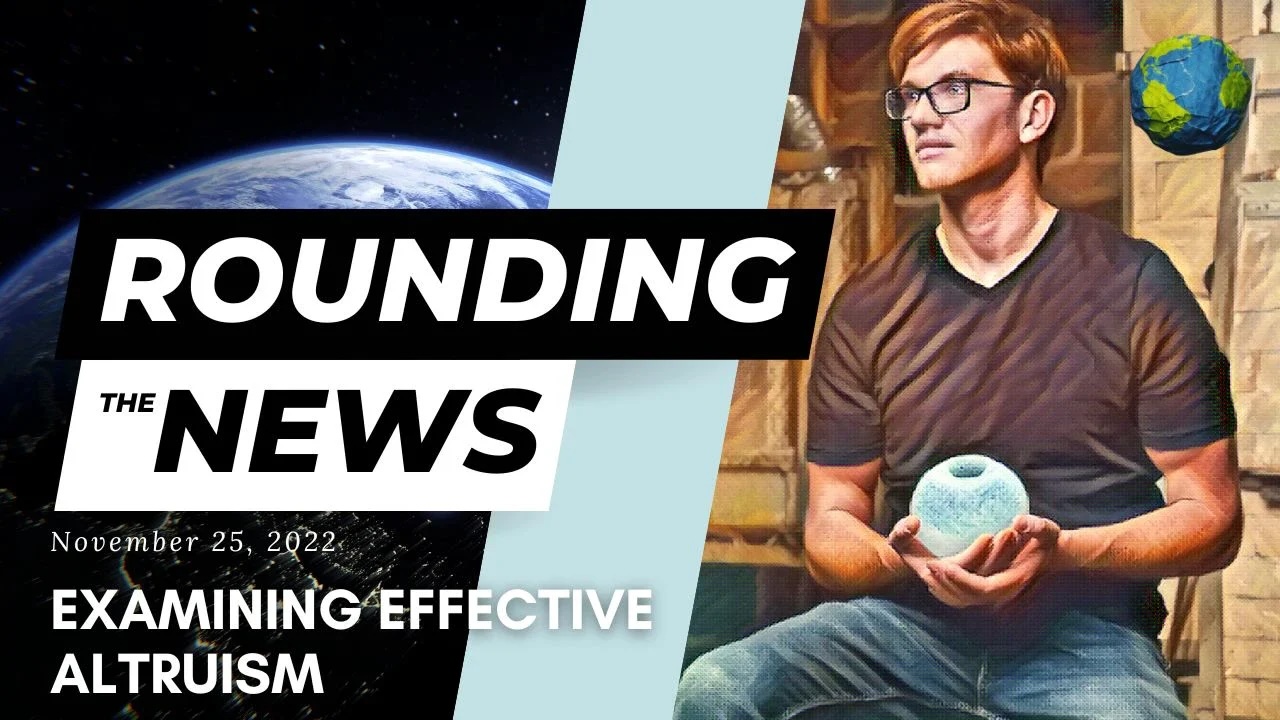William MacAskill, Giving What We Can, 80,000 Hours, Y Combinator, Centre for Effective Altruism, and more…
Originally published on Substack for Rounding the Earth
Introduction
Effective altruism has been identified as a driving ideological force behind the infamous Sam Bankman-Fried, founder of cryptocurrency giant FTX and the associated Alameda Research. There remain further areas to explore surrounding the network of organizations at its center; its role in pandemic preparedness, as well as other pseudo-philanthropic ventures around the world.

Origins
While the roots of EA extend beyond the name itself, we’re going to start with the man cited as starting the modern movement.
William MacAskill
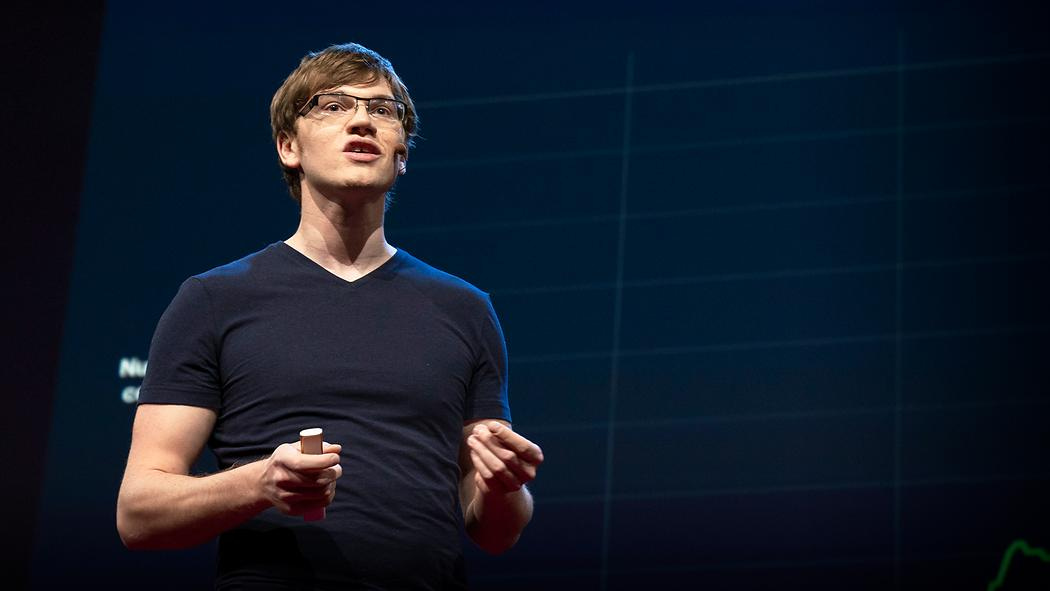
William MacAskill (née Crouch) is a British philosopher and professor at the University of Oxford.
At age 18, he was influenced by “a 1972 essay by the radical utilitarian Peter Singer,” leading him to be “shunted onto a track of rigorous and uncompromising moralism.”1 He went on to “found a moral crusade” that would allow him to “shape a new social equilibrium” in line with his worldview. As The New Yorker frames it, this was the start of the modern Effective Altruism.
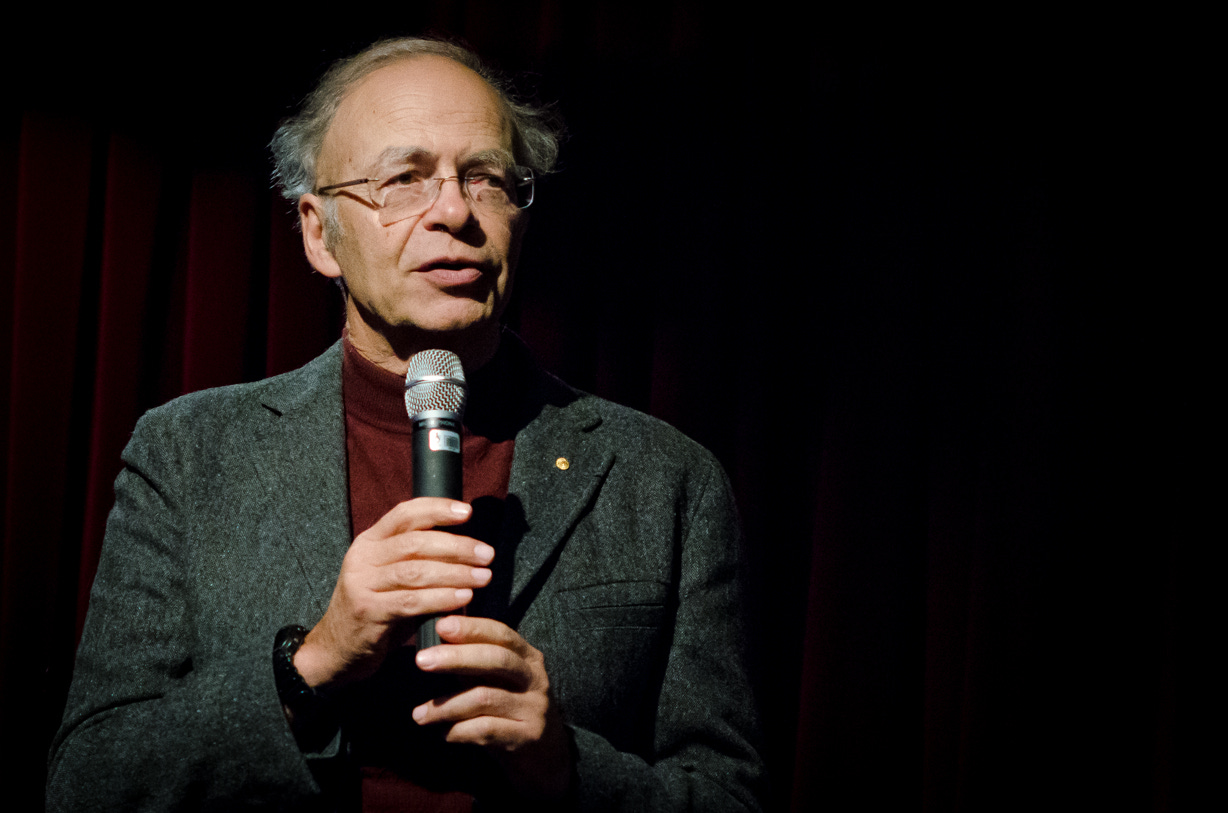
MacAskill’s early philanthropic interests seem to revolve mainly around healthcare. When he was 15, he decided to get rich in order to save people from AIDS. As a young adult, he “spent a summer volunteering at a rehabilitation center in Ethiopia” and thought about polio. However, another activity of his is worth mentioning:

Giving What We Can
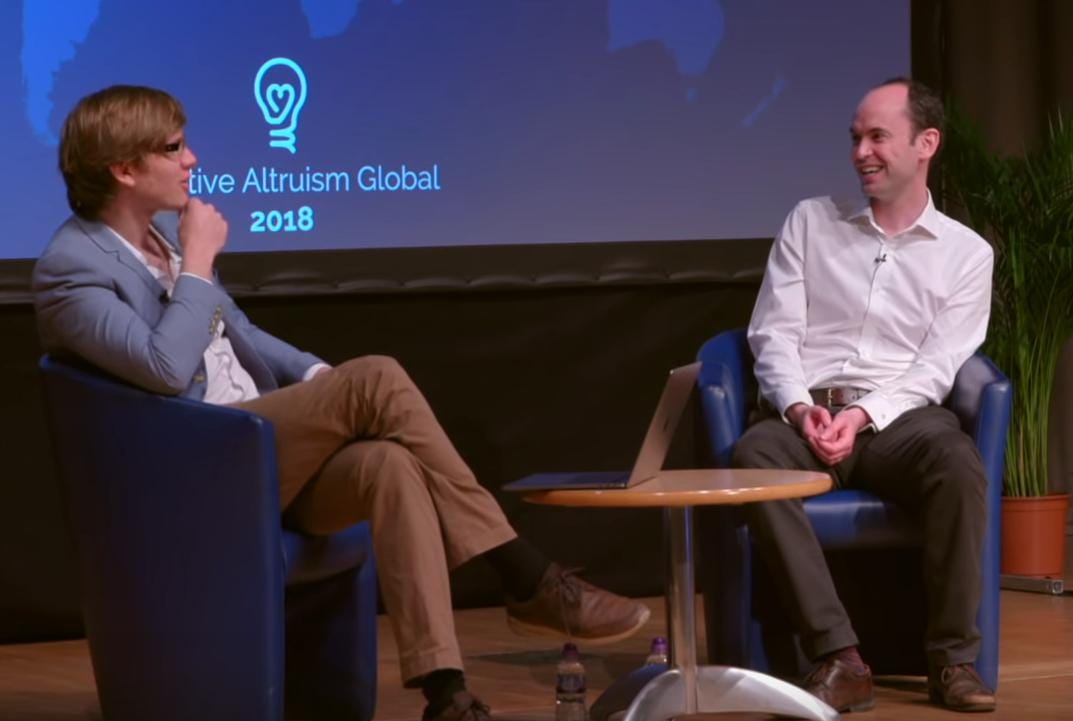
After meeting an Australian gentleman named Toby Ord, the two got along royally and decided to try to convince their friends and “other moral philosophers to pledge a secular tithe” – in other words, to commit to giving away most of their money. This led to the founding of Giving What We Can in November 2009.

At launch, the organization described itself as “an international society dedicated to eliminating poverty in the developing world.” Funding was provided by the University of Oxford through the Oxford Uehiro Centre for Practical Ethics, Balliol College and the Future of Humanity Institute.2 Later funding came from the Pears Foundation and Dr. Frederick Mulder, “a Canadian art-dealer and philanthropist” who founded The Funding Network.3
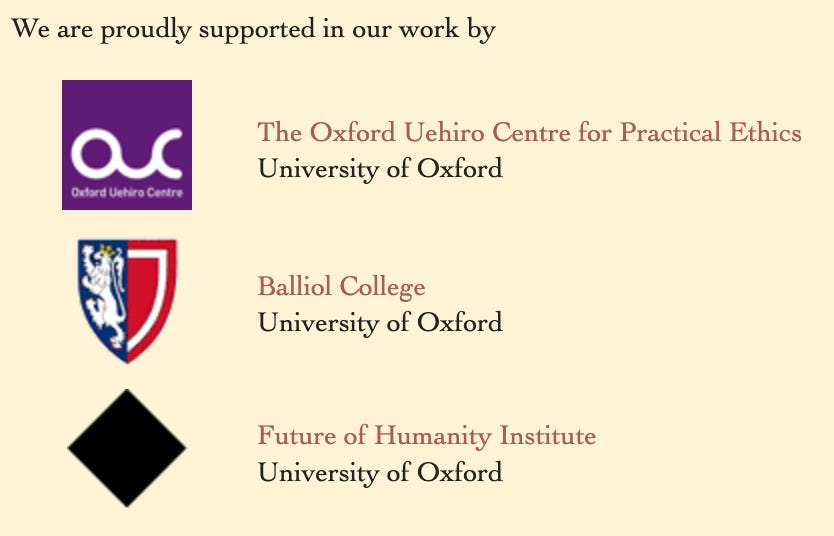
Today, Giving What We Can describes itself as “a community of effective givers,”4 and “one of the first organisations in a growing community of like-minded organisations focused on effective altruism.”5 Its main purpose seems to be to recommend specific charities where donors should direct their funds.
In 2022, some of the top suggestions for funds managed by other organizations are GiveWell, Effective Altruism Funds, Animal Charity Evaluators, Longview Philanthropy, and Founders Pledge – all of which are more directly connected than initially meets the eye.6
One of the suggested organizations is New Incentives, a program that uses “small cash incentives to boost childhood vaccination rates” among babies in Nigeria.7 Its partners include GiveWell, Good Ventures Foundation, Open Philanthropy, Y Combinator, Raising for Effective Giving, and yes – the Bill & Melinda Gates Foundation.8
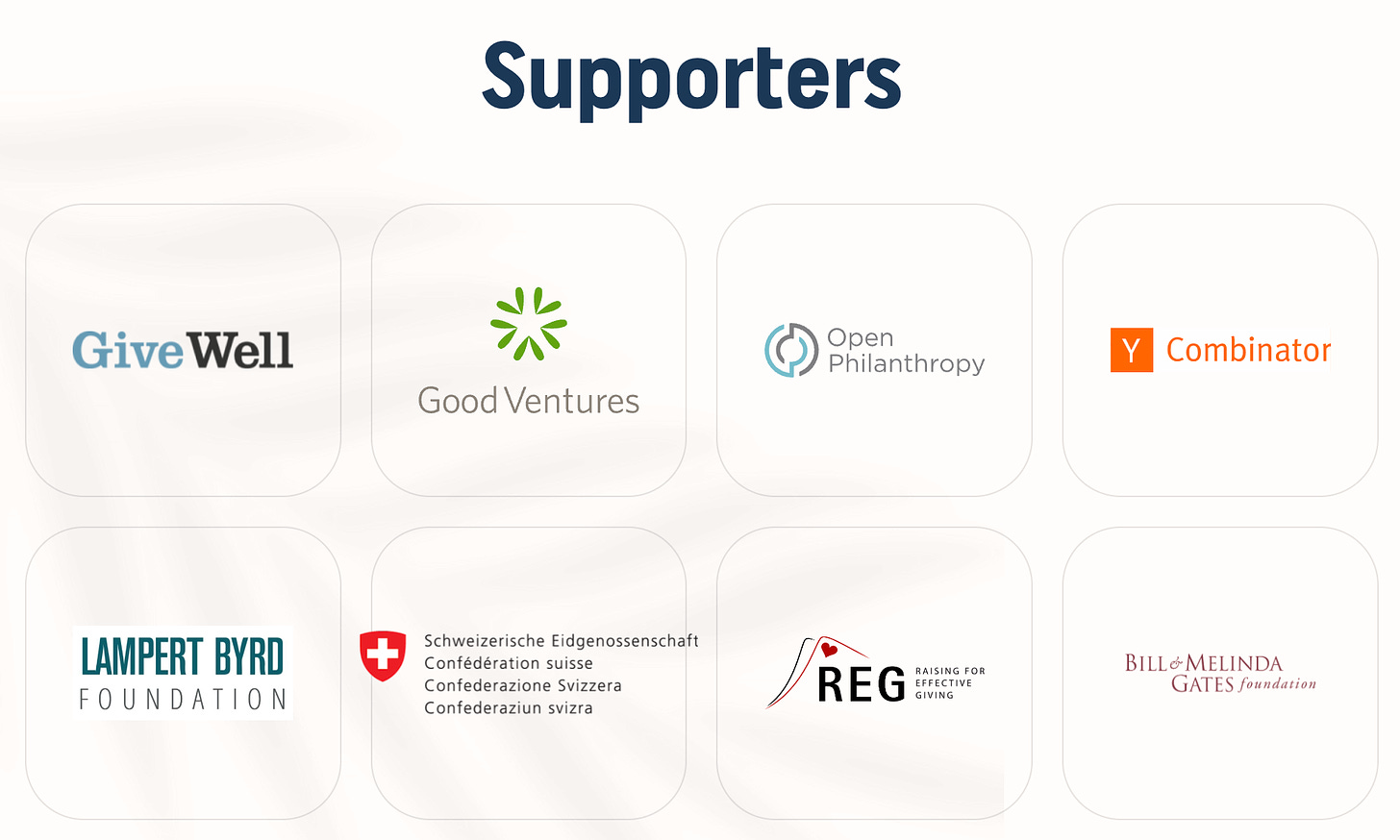
Another vaccine-related organization is Suvita, partnered with GiveWell, N/Core (an incubator of the Nudge Institute), Charity Entrepreneurship, D-Prize, Founders Pledge, Schmidt Futures (as in Eric Schmidt, of Google), The Funding Network, and Network for Social Change.9
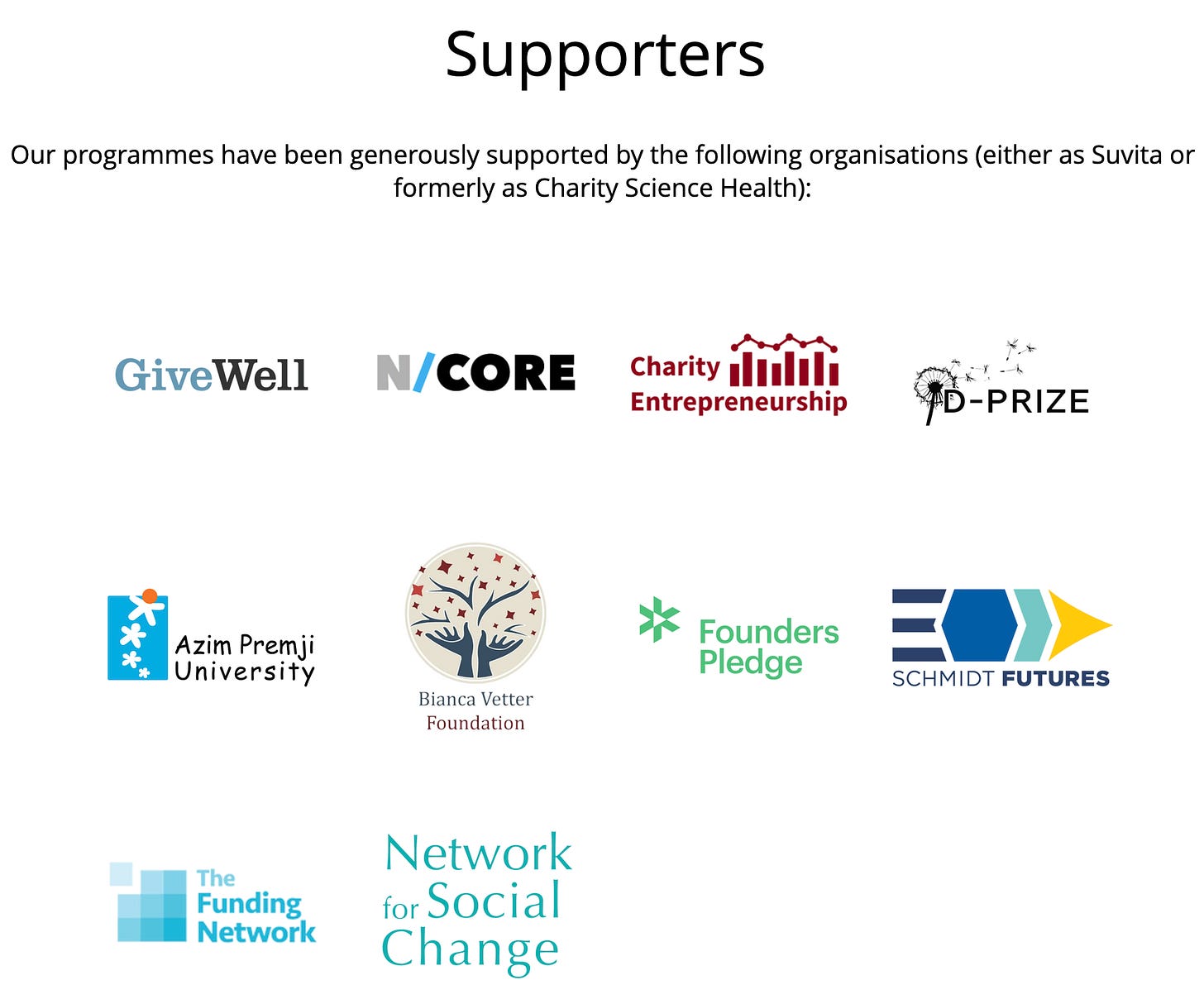
Then there’s the Iodine Global Network, whose partners and donors include UNICEF, the U.S. Centers for Disease Control and Prevention (CDC), United States Agency for International Development (USAID), the Good Ventures Foundation, and Giving What We Can itself.10, 11
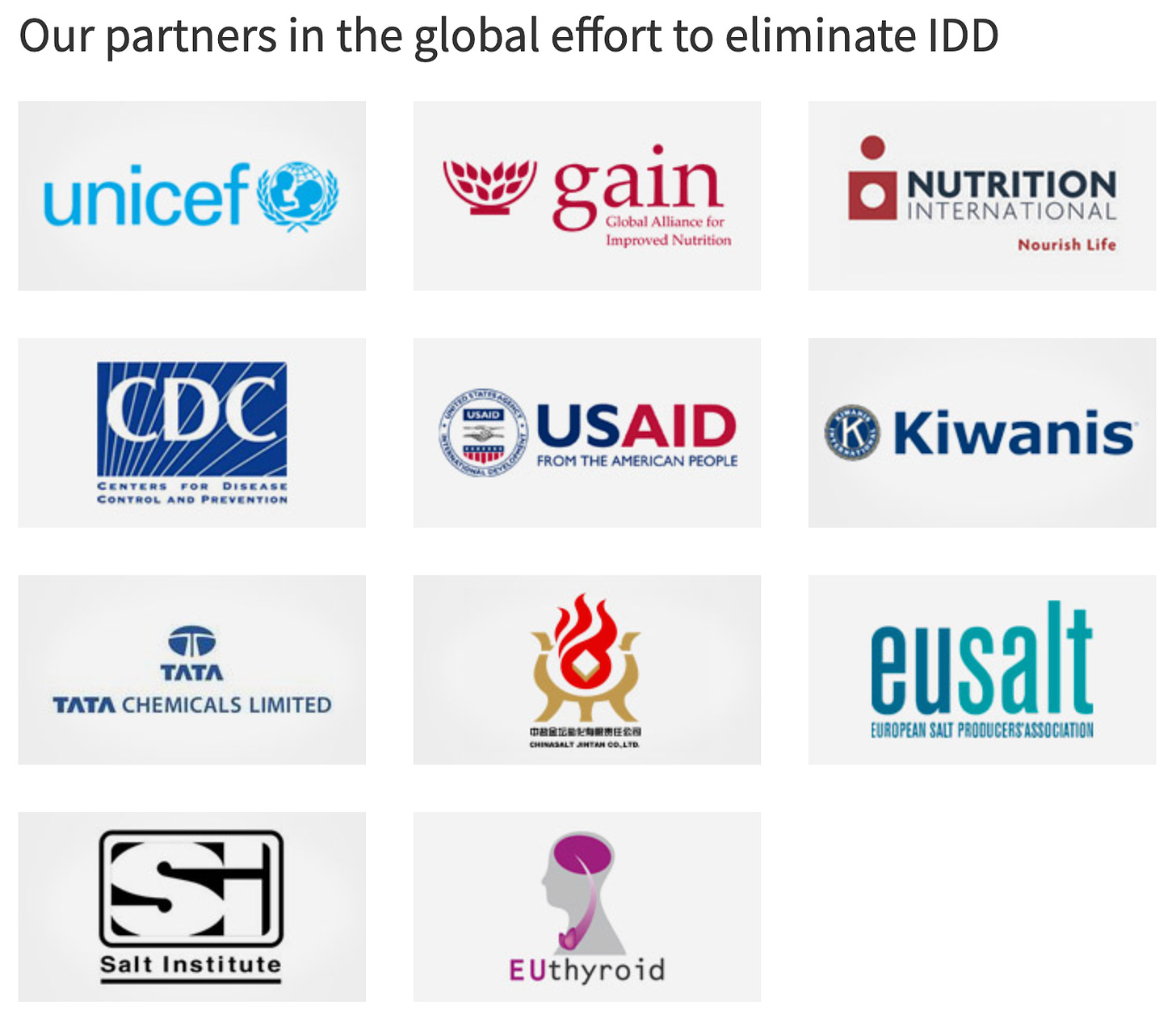
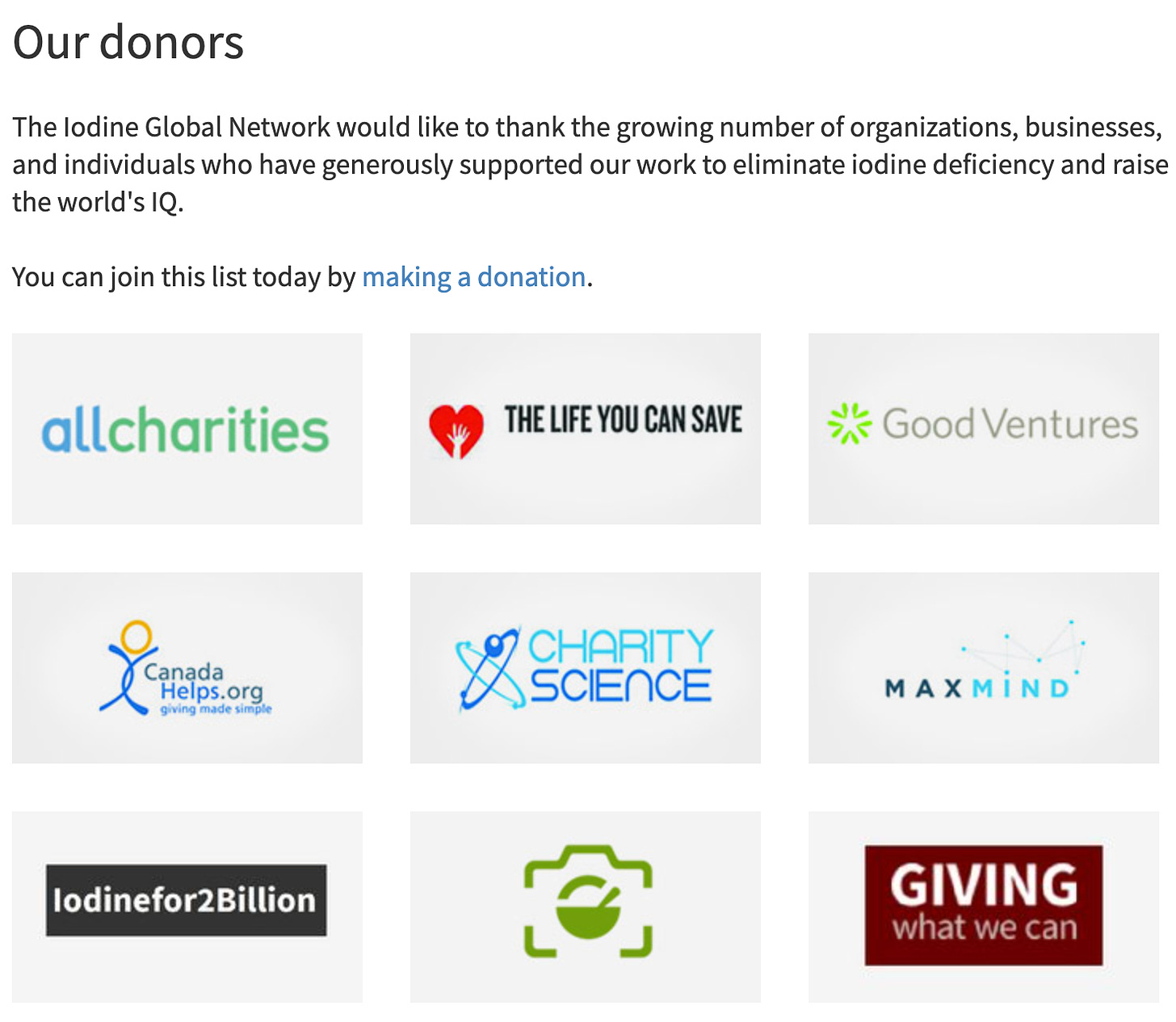
Every charity and organization on Giving What We Can’s list deserves deep scrutiny, but none more so than the Nuclear Threat Initiative (NTI) and the Johns Hopkins Center for Health Security. These two organizations are deeply tied to the most significant pandemic preparedness programs worldwide, including virtually all of the major exercises the public is quickly becoming familiar with.
For example, NTI co-hosted a tabletop simulation of a weaponized monkeypox outbreak in March 2021, accurately predicting May 2022 as the start of the “real-world” monkeypox outbreak. Christopher R. Isaac, an alumnus of the JHCHS Emerging Leaders in Biosecurity Fellowship, co-authored the scenario.12 Open Philanthropy (now clearly becoming a recurring name) funded the exercise.
80,000 Hours
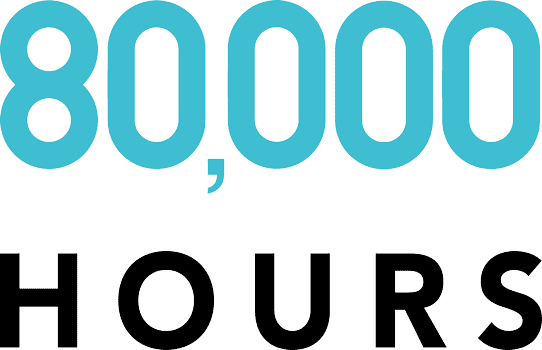
As MacAskill neared graduation, he reportedly experienced an understandable mini-crisis while trying to decide how to move ahead in his career. This led him and his classmate Benjamin Todd to launch 80,000 Hours in October 2011.13 80,000 Hours is described as “an offshoot of Giving What We Can designed to offer ‘ethical life-optimisation’ advice to undergraduates.”
According to Todd’s LinkedIn profile, he was “the first undergraduate to work as equity analyst at $20bn+ asset manager” in his role at Orbis Investment Advisory.14
MacAskill delivered several talks in this period, purportedly inspiring members of the audience to sign his pledge and take on lucrative positions at companies such as PricewaterhouseCoopers. In the case of a “student of Singer’s at Princeton” named Matt Wage, however, a job at a firm called Jane Street Capital. Wage also had health-related inclinations, thinking about how to “cure between 400 and 2,000 people in developing countries of blindness from glaucoma” and donating a kidney – while seeming unconcerned with the question of pesticide use and suicide rates.
80,000 Hours is funded primarily by Open Philanthropy, with additional support from Effective Altruism Funds, Y Combinator, Ben Delo (the BitMEX founder who just pled guilty to civil and criminal charges related to securities issues),15 the Berkeley Existential Risk Initiative (BERI), and the infamous later-FTX-founder Sam Bankman-Fried.16
One donor, BERI, collaborates with a number of interesting organizations at the intersection of human genetics and artificial intelligence (AI).17

Centre for Effective Altruism

As the story goes, the expanding EA portfolio managed by MacAskill and friends required the introduction of “an umbrella nonprofit with paid staff” under which Giving What We Can and 80,000 Hours could be incorporated. Thus, the Centre for Effective Altruism was launched in 2012.18 Benjamin Todd (MacAskill’s 80,000 co-founder) joined the CEA as a senior advisor.
In August 2012, yet another organization was launched, this time as a sub-project of 80,000 Hours: Effective Animal Activism,19 which was renamed to Animal Charity Evaluators (ACE) in 2013 and spun out into its own organization.20

Another person inspired by MacAskill’s work was Julia Wise, who had previously worked with Oxfam America and the Jewish Vocational Service.21 This led into a short career in mental health-related social work at BayRidge Hospital in Lynn, Massachusetts, followed by psychiatric work at South Bay House of Correction (a Suffolk County jail). So moved was she by MacAskill and his EA ventures, Wise apparently donated most of her savings to the CEA. She started work at the Centre for Effective Altruism in 2015, serving as president of Giving What We Can from 2017-2020 and on the board of GiveWell.22
MacAskill was hired as an associate professor at Oxford in 2015. At the very young age of 28, he “was said to be the youngest such philosophy professor in the world.”
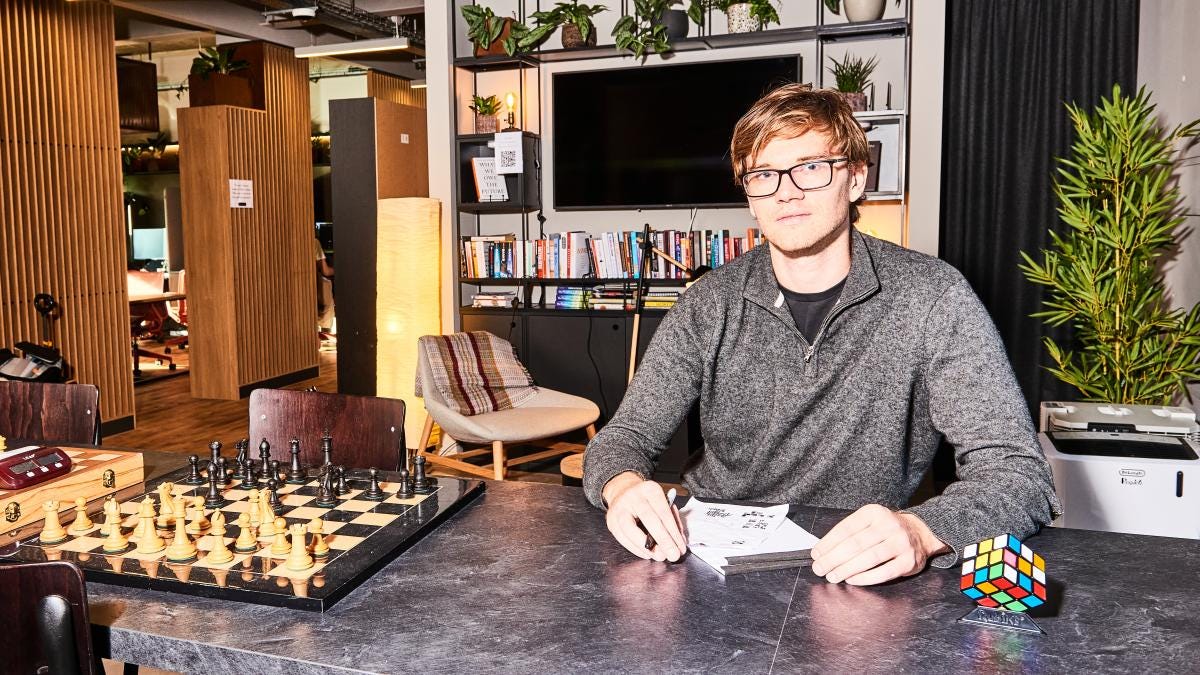
In June 2015, 80,000 Hours was “accepted into Y Combinator, a prestigious startup incubator.”23 This granted the non-profit a $100,000 donation, and put them under the guiding hand of Paul Buchheit, founder of Gmail.24
Y Combinator is an intimidating entity to examine, if only because it claims responsibility for launching a long list of important companies and services.25 The biggies include Airbnb, Doordash, Coinbase, Dropbox, Stripe, Instacart, Reddit, Twitch, Weebly, Teespring, 9GAG… even Substack, the very platform on which I’m typing this report.
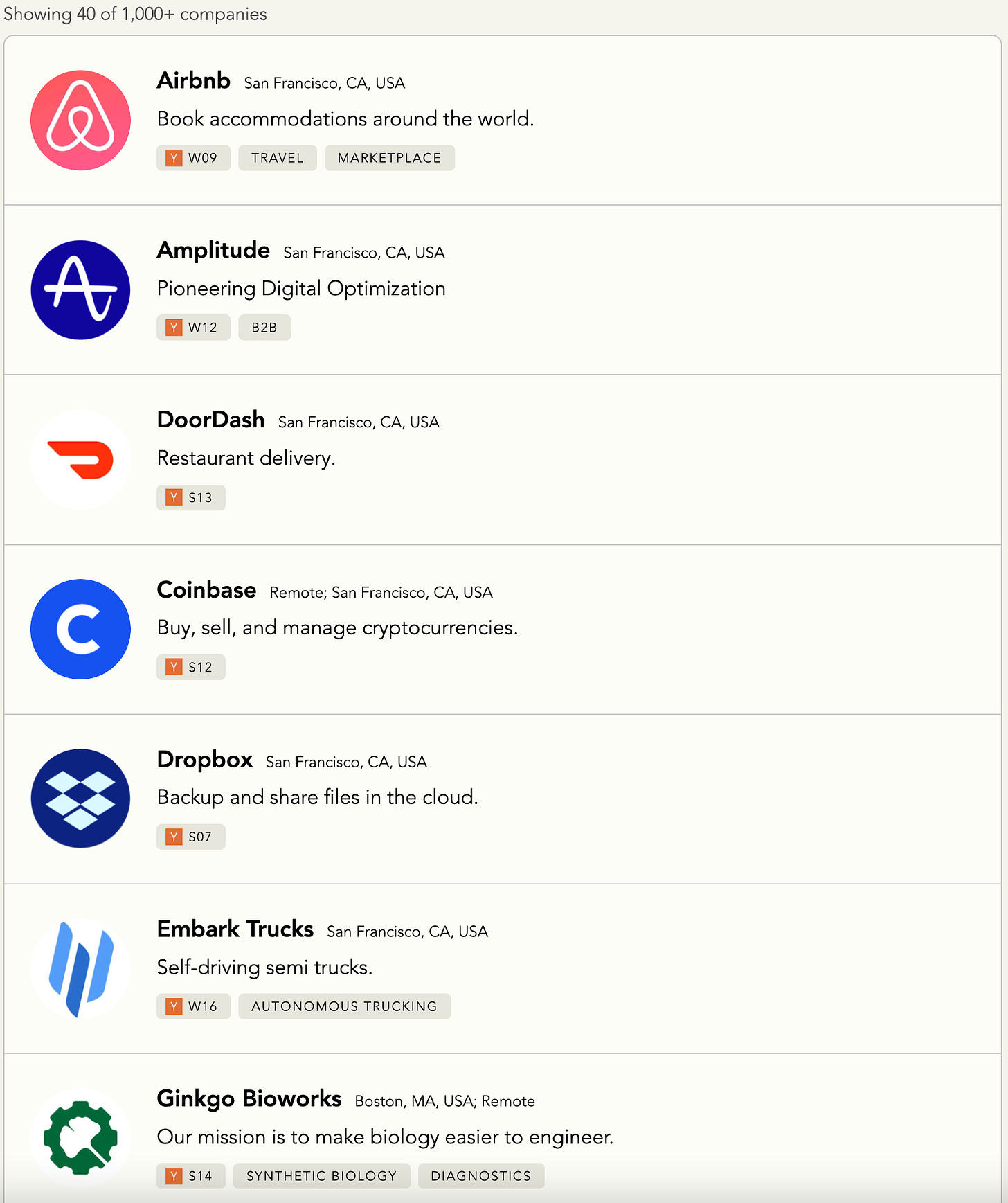
In fact, the same year it brought 80,000 Hours into its fold, Y Combinator had also expanded its reach to recruit companies in biotechnology, driverless cars, and nuclear energy.26 Embark Trucks and Cruise are working on driverless tech. Momentus is a space technology company that made headlines in April after signing a deal with Elon Musk’s SpaceX.27 The Immunity Project is “developing a free vaccine to end HIV and AIDS.”28
Then, there’s Ginkgo Bioworks, a company that has been admirably scrutinized by Whitney Webb and Derrick Broze. In Derrick’s article for The Last American Vagabond almost two years ago:29
Ginkgo Bioworks was founded in 2009 by a group of MIT scientists focused on “engineering biology” for a variety of purposes. Officially, Ginkgo Bioworks “designs, engineers, develops, tests and licenses organisms”. The company refers to their work as “biology by design”, stating that they “program cells to make everything from food to materials to therapeutics.” Ginkgo’s researchers use genetic engineering to design and “print” new DNA for a range of organisms, including plants and bacteria. These organisms can then be licensed out for artificial flavors and sweeteners, cosmetic ingredients, crop treatments and pharmaceuticals.
He also notes the significant investments poured into Ginkgo Bioworks, including from Bill Gates through his Cascade Investment firm. It also received a $1.1 billion loan in November 2020 from the U.S. International Development Finance Corp (DFC) “for COVID-19 testing and the production of raw materials for therapies that may help address future pandemics.”30 As it turns out, Ginkgo also played a key role in the manufacturing of Moderna’s COVID-19 genetic “vaccine” product, mRNA-1273.31

To add insult to injury, Wikipedia offers this:
In October 2022, Bloomberg News reported that Ginkgo Bioworks partnered with Intelligence Advanced Research Projects Activity to create a software tool to help detect when biological organisms have been genetically engineered. The tool known as ENDAR (short for Engineered Nucleotide Detection and Ranking) could be used to provide an early warning of bioweapons and other man-made biological threats.32
As a final note on Y Combinator for the time being, its founder Sam Altman played an important role in the COVID-19 crisis as well as the 2020 Presidential Election.
In April 2020, he set up Project Covalence in order to “help researchers rapidly launch clinical trials” to accelerate the “development of treatments and diagnostics for COVID-19.”33
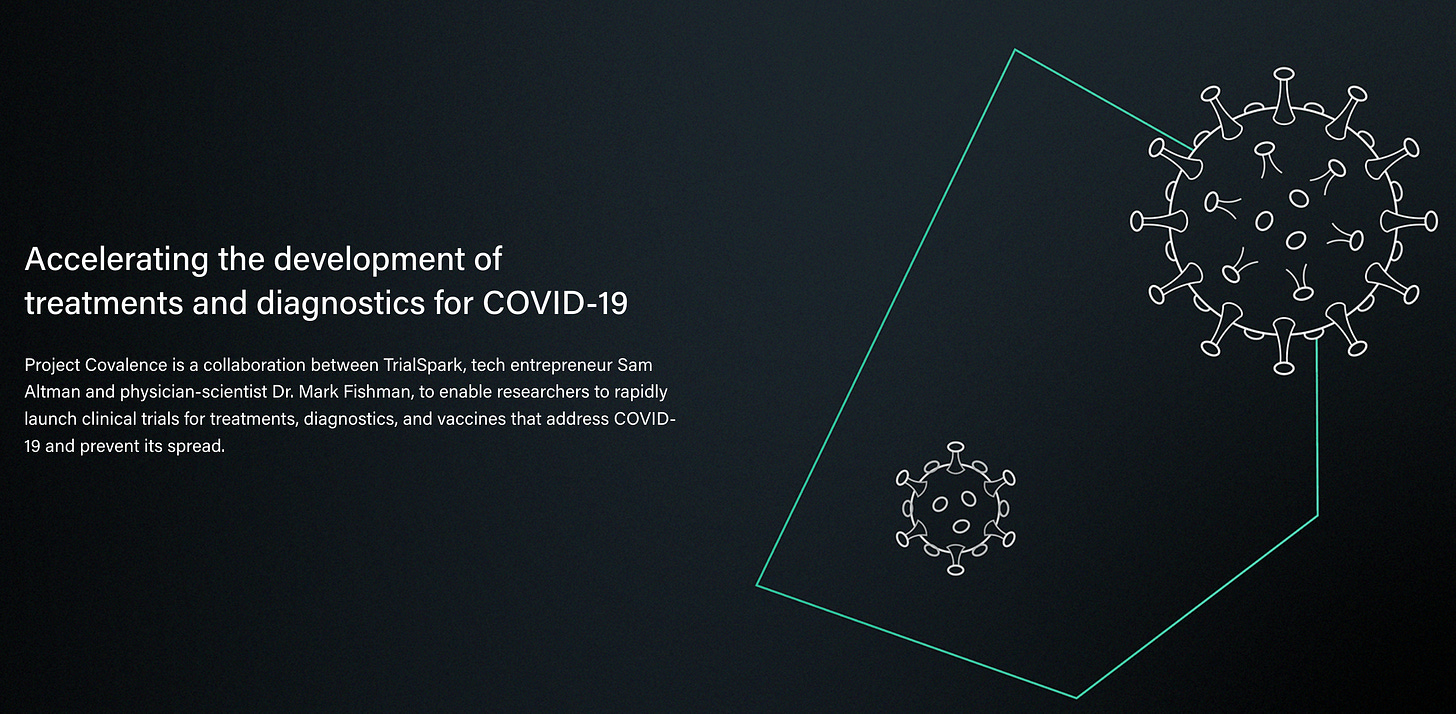
Project Covalence was a collaboration with Mark Fishman, founder of the Novartis Institutes for Biomedical Research,34 and TrialSpark, a “new-age pharma company” partnered with Pfizer, Novartis, Sanofi, and Fishman’s Aditum Bio.35

Of course, the web keeps expanding; one of TrialSpark’s top investors is Sequoia Capital, a major investor in FTX.36
In May 2020, Altman donated $250k to American Bridge 21st century, a Super-PAC supporting the successful election of Joe Biden to the presidency.37
Effective Altruism Global

Jumping back slightly brings us to the inaugural Effective Altruism Global event, held in June/July 2013 in the San Franciso Bay Area.38 The 7-day event was hosted by the Centre for Effective Altruism, with participation from 80,000 Hours, Center for Applied Rationality, Effective Animal Activism (Animal Charity Evaluator), GiveWell, Giving What We Can, Leverage Research, Machine Intelligence Research Institute (MIRI), and The High Impact Network (THINK).39
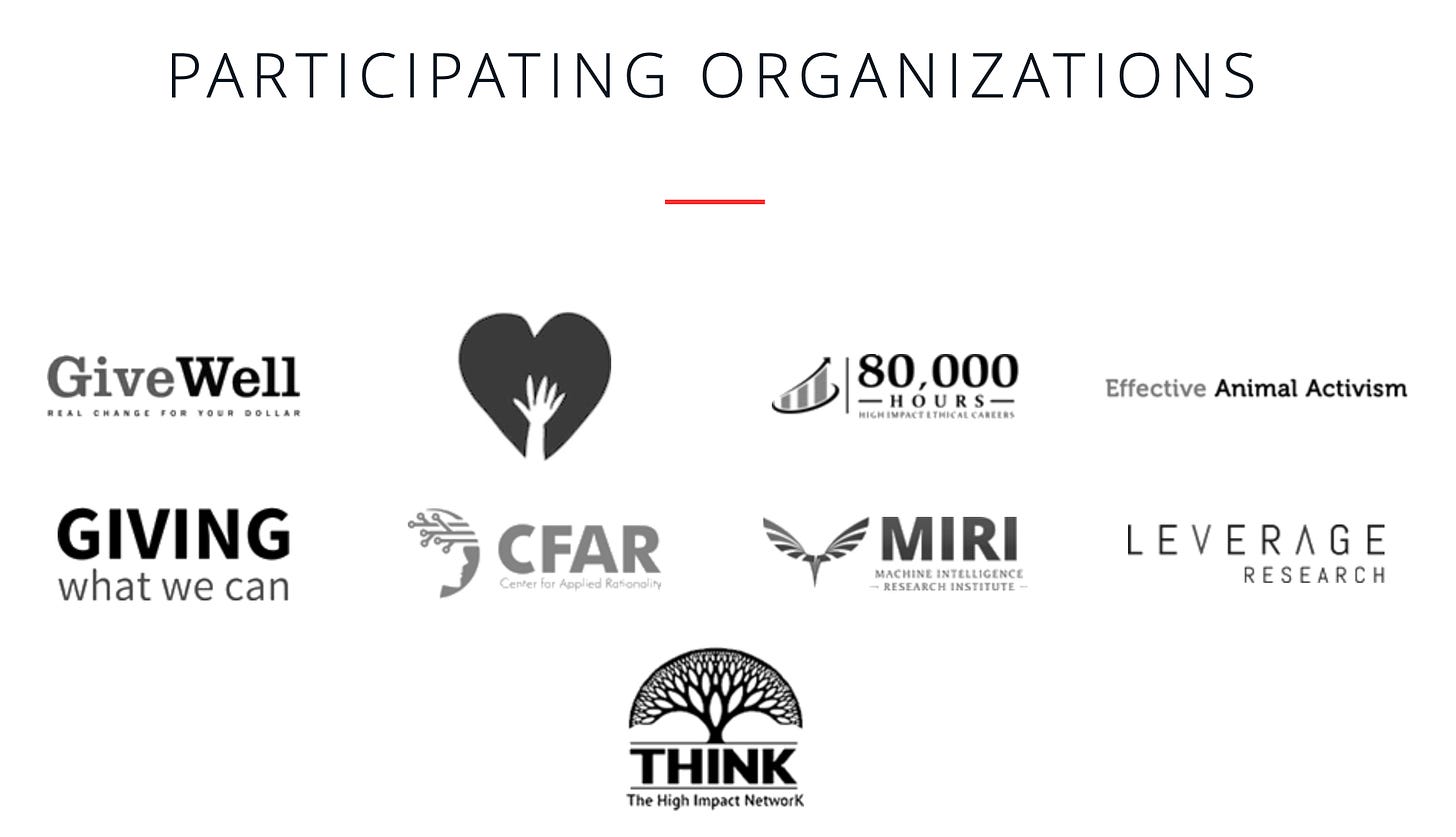
One participating organization, MIRI, is closely linked to a number of high-profile individuals and organizations, especially in the cryptocurrency space. This includes Vitalik Buterin, the inventor and co-founder of Ethereum; the Thiel Foundation, the foundation funded by Paypal co-founder and venture capitalist Peter Thiel; the Berkeley Existential Risk Initiative; Jaan Tallinn, co-creator of Skype who cofounded the Future of Life Institute and the Centre for the Study of Existential Risk; Jed McCaleb, developer of the Ripple and Stellar currency exchange systems; Open Philanthropy; and at least two anonymous Ethereum donors.40 Others include the aforementioned Ben Delo, Effective Altruism Funds, Raising for Effective Giving, and Alameda Research.41
The event attracted very high profile speakers including Peter Singer, Peter Thiel and Holden Karnofsky, co-founder of GiveWell.
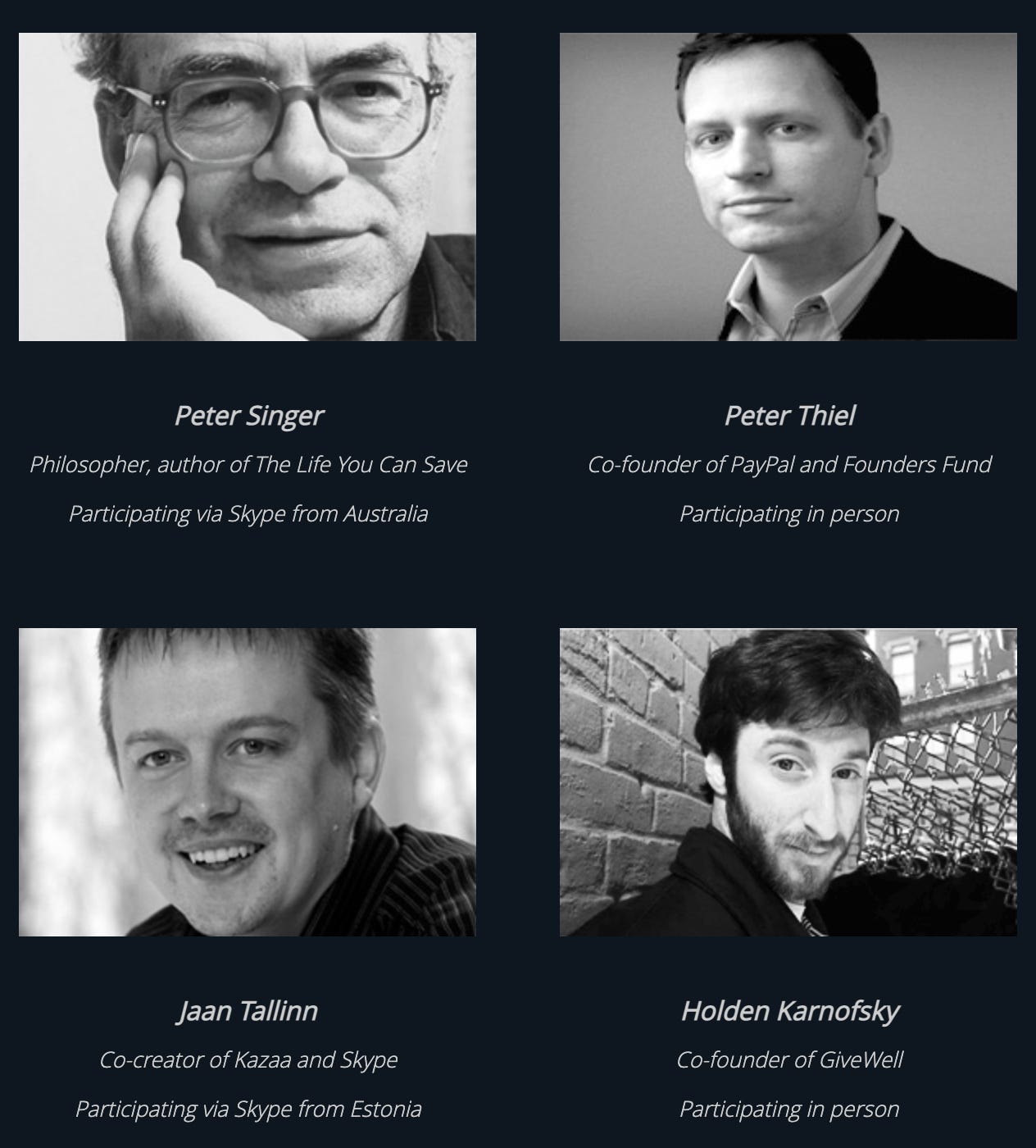
The 2014 summit was joined by additional partners in the Future of Humanity Institute, the Google-backed GiveDirectly, Founders Fund, Future of Life Institute, The Life You Can Save, and Population Services International (an organization partnered with the Bill & Melinda Gates Foundation, Children’s Investment Fund Foundation, Global Affairs Canada, Margaret A. Cargill Philanthropies, UNICEF, Unitaid, USAID, and the World Bank).42, 43
The following year, the summit went truly global. From Wikipedia:
In 2015, there were three main EA Global events. The largest was a three-day conference that took place on the Google campus in Mountain View, California, with speakers including entrepreneur Elon Musk, computer scientist Stuart J. Russell, and Oxford philosophy professor William MacAskill. There were also conferences in Oxford and Melbourne. According to MacAskill, the nature of the conferences improved coordination and ideological diversity within effective altruism. Talks included subjects such as global poverty, animal advocacy, cause prioritization research, and policy change.
According to MacAskill, he tried to speak to Musk at the event “for five minutes about global poverty and got little interest.” Still, Musk’s role in the EA community is not insignificant by this point; he is a major funder of the Future of Humanity Institute at Oxford, which is directly tied to many individuals and organizations discussed thus far.44
Open Philanthropy

As I write this report, the elephant in the room is looming larger and larger. One of the names that continues to recur throughout the story is Open Philanthropy. What is this ever-present organization, and what is its role in connecting Effective Altruism and biosecurity?
To be continued…
References
- Nast, C. (2022, August 8). The Reluctant Prophet of Effective Altruism. The New Yorker. http://archive.today/2023.01.09-045652/https://www.newyorker.com/magazine/2022/08/15/the-reluctant-prophet-of-effective-altruism ↩︎
- About Us. Giving What We Can. Retrieved July 26, 2011, from https://web.archive.org/web/20110726122707/http://www.givingwhatwecan.org/about-us/ ↩︎
- Our Funders and Supporters. Giving What We Can. Retrieved April 3, 2013, from https://web.archive.org/web/20130403042539/http://www.givingwhatwecan.org:80/about-us/our-funders-and-supporters ↩︎
- Homepage. Giving What We Can. Retrieved September 10, 2022, from http://archive.today/2022.09.10-163209/https://www.givingwhatwecan.org/ ↩︎
- About us. Giving What We Can. Retrieved October 20, 2022, from https://web.archive.org/web/20221020224446/https://www.givingwhatwecan.org/about-us ↩︎
- Best charities in 2022: Most effective charities that maximise impact. Giving What We Can. Retrieved November 11, 2022, from https://web.archive.org/web/20221111220952/https://www.givingwhatwecan.org/best-charities-to-donate-to-2022 ↩︎
- How It Works. New Incentives. Retrieved May 17, 2022, from https://web.archive.org/web/20220517040608/https://www.newincentives.org/how
↩︎ - About Us. New Incentives. Retrieved November 25, 2022, from http://archive.today/2022.11.25-064921/https://www.newincentives.org/about ↩︎
- Supporters. Suvita. Retrieved May 19, 2022, from https://web.archive.org/web/20220519093315/https://www.suvita.org/supporters-1 ↩︎
- Our partners in the global effort to eliminate IDD. Iodine Global Network (IGN). Retrieved November 25, 2022, from https://www.ign.org/our-partners.htm ↩︎
- Our donors. Iodine Global Network (IGN). Retrieved November 25, 2022, from https://web.archive.org/web/20221201031704/https://www.ign.org/our-donors.htm ↩︎
- Yassif, J., Kevin, P., O’prey, Christopher, R., & Isaac. (2021). Strengthening Global Systems to Prevent and Respond to High-Consequence Biological Threats. Nuclear Threat Initiative. https://web.archive.org/web/20211124014456/https://www.nti.org/wp-content/uploads/2021/11/NTI_Paper_BIO-TTX_Final.pdf ↩︎
- About us: what do we do, and how can we help? 80,000 Hours. Retrieved November 24, 2022, from https://web.archive.org/web/20221124173407/https://80000hours.org/about/ ↩︎
- Experience | Benjamin Todd. LinkedIn. Retrieved November 25, 2022, from https://www.linkedin.com/in/benjamin-j-todd/details/experience/ ↩︎
- De, N. (2022, June 15). BitMEX’s Delo Will Not Face Prison After Guilty Plea. Coindesk. https://web.archive.org/web/20220615223242/https://www.coindesk.com/business/2022/06/15/bitmexs-delo-will-not-face-prison-after-guilty-plea/ ↩︎
- Our donors. 80,000 Hours. Retrieved November 11, 2022, from http://archive.today/2022.11.11-184059/https://80000hours.org/about/donors/ ↩︎
- Collaborations. Berkeley Existential Risk Initiative. Retrieved December 8, 2022, from https://web.archive.org/web/20221208223244/https://existence.org/collaborations/ ↩︎
- Bajekal, N. (2022, August 10). Inside the Growing Movement to Do the Most Good Possible. Time. https://web.archive.org/web/20220810115909/https://time.com/6204627/effective-altruism-longtermism-william-macaskill-interview/ ↩︎
- Fischer, E. (2012, August 17). Project Launch: Effective Animal Activism. 80,000 Hours. https://web.archive.org/web/20220705144515/https://80000hours.org/2012/08/project-launch-effective-animal-activism/ ↩︎
- Perez, D. (2015, July). 2015 Internal Evaluation. Animal Charity Evaluators. https://web.archive.org/web/20221125061113/https://animalcharityevaluators.org/transparency/internal-evaluations/2015-internal-evaluation/ ↩︎
- Experience | Julia Wise. LinkedIn. Retrieved November 25, 2022, from https://www.linkedin.com/in/juliawise/details/experience/ ↩︎
- Julia Wise. Centre for Effective Altruism. Retrieved February 20, 2020, from https://web.archive.org/web/20200220215449/https://www.centreforeffectivealtruism.org/team/julia-wise/ ↩︎
- Todd, B. (2015, August 5). What’s it like being a nonprofit in Y Combinator? 80,000 Hours. https://web.archive.org/web/20220922094728/https://80000hours.org/2015/08/why-is-80000-hours-in-y-combinator-as-a-non-profit-and-whats-it-like/ ↩︎
- Lenssen, P. (2007, July 16). Paul Buchheit on Gmail, AdSense and More. Blogoscoped. http://archive.today/2012.05.27-062010/http://blogoscoped.com/archive/2007-07-16-n55.html
↩︎ - The YC Startup Directory. Y Combinator. Retrieved November 25, 2022, from https://www.ycombinator.com/companies ↩︎
- Y Combinator President Sam Altman Is Dreaming Big. (2015, April 16). Fast Company. https://web.archive.org/web/20170204145553/https://www.fastcompany.com/3044282/the-y-combinator-chronicles/california-dreamin ↩︎
- Bakshi, A. (2022, April 7). Momentus Stock Skyrockets On Launch Agreements With Elon Musk’s SpaceX – Momentus (NASDAQ:MNTS). Benzinga. https://www.benzinga.com/news/22/04/26519154/momentus-stock-skyrockets-on-launch-agreements-with-elon-musks-spacex ↩︎
- Home. Immunity Project. Retrieved January 26, 2014, from http://archive.today/2014.01.26-120242/http://www.immunityproject.org/ ↩︎
- Broze, D. (2021, July 24). Who is Ginkgo Bioworks and How Do They Fit In the Bio-Security, Transhumanist Agenda? The Last American Vagabond. http://archive.today/2021.07.25-033925/https://www.thelastamericanvagabond.com/ginkgo-bioworks-bio-security-transhumanist-agenda/
↩︎ - Spalding, R. (2020, November 25). U.S. loans $1.1 billion to Ginkgo Bioworks for pandemic effort. Reuters. http://archive.today/2021.08.01-125032/https://www.reuters.com/article/us-health-coronavirus-loan-ginkgo/u-s-loans-1-1-billion-to-ginkgo-bioworks-for-pandemic-effort-idUSKBN2851TA ↩︎
- Kelly, J. (2020, April 15). Supporting Moderna’s efforts for COVID-19 response. Ginkgo Bioworks. http://archive.today/2022.11.25-112958/https://www.ginkgobioworks.com/2020/04/15/supporting-modernas-efforts-for-covid-19-response/ ↩︎
- Griffin, R. (2022, October 17). Ginkgo Is Trying to Detect Future Man-Made Biological Threats. Bloomberg. http://archive.today/2022.10.18-034503/https://www.bloomberg.com/news/articles/2022-10-17/ginkgo-is-trying-to-detect-future-man-made-biological-threats ↩︎
- Altman, S. (2020, June 16). Project Covalence. Sam Altman. http://archive.today/2020.06.21-210404/https://blog.samaltman.com/project-covalence ↩︎
- Herper, M. (2020, June 16). A tech investor’s rude awakening on clinical trials sparks an effort to make them faster for Covid-19. STAT. https://web.archive.org/web/20200616165710/https://www.statnews.com/2020/06/16/tech-investor-covid-trials/ ↩︎
- We’re TrialSpark: A tech-driven drug development partner. TrialSpark. Retrieved November 25, 2022, from http://archive.today/2022.11.25-195749/https://www.trialspark.com/ ↩︎
- Jin, B. (2022, November 22). WSJ News Exclusive | Sequoia Capital Apologizes to Its Fund Investors for FTX Loss. Wall Street Journal. http://archive.today/2022.11.23-040957/https://www.wsj.com/amp/articles/sequoia-capital-apologizes-to-limited-partners-for-ftx-investment-11669144914 ↩︎
- Tindera, M. (2020, May 22). Silicon Valley’s Sam Altman Gave $250,000 To Democratic Super-PAC Supporting Biden. Forbes. http://archive.today/2024.02.09-042429/https://www.forbes.com/sites/michelatindera/2020/05/22/silicon-valleys-sam-altman-gave-250000-to-democratic-super-pac-supporting-biden/?sh=3d3c664e12c4 ↩︎
- Tallinn, J. (2013, November 13). Jaan Tallinn’s Keynote – Effective Altruism Summit 2013. Exponential Times. https://web.archive.org/web/20190816033651/http://www.exponentialtimes.net/videos/jaan-tallinns-keynote-effective-altruism-summit-2013 ↩︎
- Home. Effective Altruism Summit. Retrieved August 2, 2013, from https://web.archive.org/web/20130802184339/http://www.effectivealtruismsummit.com/ ↩︎
- Transparency and Financials. Machine Intelligence Research Institute. Retrieved October 30, 2022, from https://web.archive.org/web/20221030130001/https://intelligence.org/transparency/ ↩︎
- Top Contributors. (2021, November 13). Machine Intelligence Research Institute. https://web.archive.org/web/20211202013920/https://intelligence.org/topcontributors/ ↩︎
- Partner With Us. PSI. Retrieved May 29, 2022, from http://archive.today/2022.05.29-183317/https://www.psi.org/partner-with-us/ ↩︎
- Home. Effective Altruism Summit. Retrieved February 23, 2015, from https://web.archive.org/web/20150223144458/http://www.effectivealtruismsummit.com/ ↩︎
- Support FHI. (2021). Future of Humanity Institute. http://archive.today/2021.10.20-171440/https://www.fhi.ox.ac.uk/support-fhi/ ↩︎
